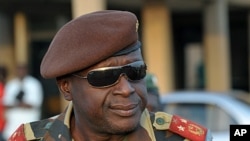A senior official of the Economic Community of West African States (ECOWAS) has called for United Nations support as the Security Council deliberates on the situation in Guinea-Bissau Monday.
ECOWAS political director Abdel-Fatau Musah said U.N. support is crucial because it will show a united international effort to restore constitutional rule in the West African nation.
“We need the Security Council to support us, we need the African Union to support the ECOWAS position, so that the stakeholders in Guinea-Bissau will realize that the international community is united around the desire to get that country back to normalcy, as quickly as possible,” said Musah.
ECOWAS has said it wants to expedite the restoration of constitutional rule in Guinea-Bissau and to implement plans for security sector reform there.
The sub-regional bloc imposed financial, economic and diplomatic sanctions on Guinea-Bissau after the military junta refused to allow interim President Raimundo Pereira to resume power and manage the return to civilian rule.
“The sanctions are meant to make the parties … see that the only chance for them is a rapid restoration of constitutional order in the country. ECOWAS would definitely like the Security Council to support the sanctions,” said Musah.
The ECOWAS official added, “today’s Security Council meeting will hinge around the political aspect of the situation. That is, what kind of transition are we looking at here, after the release of the prime minister and the interim president…The Security Council will seek to put more pressure on the stakeholders in Guinea-Bissau.”
He said another important issue is the deployment of an ECOWAS standby force to help the political transition.
“[Guinea-Bissau’s] military has accepted the deployment of the ECOWAS standby force,” Musah said, “to help secure the transition, to start work on the security sector reform that has been on ice for several months now, and also to ensure that the Angolan military contingent in that country leaves peacefully.”
Some observers have expressed concern that the presence of Angolan troops has increased tension between Guinea-Bissau’s military and Angola.
At the May 3rd heads of state and government summit in Senegal, leaders called for the deployment of a regional military force in Guinea-Bissau to oversee the withdrawal of an Angolan technical assistance mission, to ensure the security of the transition and help with security sector reform.
“The ECOWAS standby force elements are also talking with the military in Guinea-Bissau on the modalities for the deployment of ECOWAS forces… The deployment of the ECOWAS standby force is very critical to secure the environment for the transition,” said Musah.
The grouping proposed a 12-month transition period after holding talks with the junta. But leaders of the coup rejected the proposal, which also called for the interim president to lead the transition.
“What ECOWAS has done is to try to remain as much as possible within the constitution of Guinea-Bissau. And so we don’t understand why the majority party PAIGC [African Party for the Independence of Guinea and Cape Verde], for example, will be opposing the proposal by ECOWAS.”
Musah said ECOWAS expects the Security Council to back the sub- regional bloc’s plans.
Last week, the sub-regional bloc welcomed the release of Carlos Gomes Junior, Guinea-Bissau's former prime minister and presidential election front-runner, and ousted interim President Raimundo Pereira. The two had been arrested by soldiers during last month's coup. But the group also demanded the release of all other people still detained illegally in the country.




